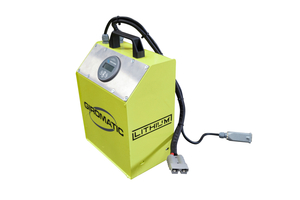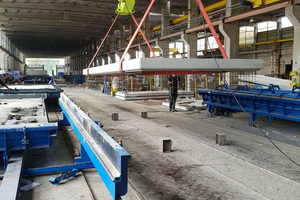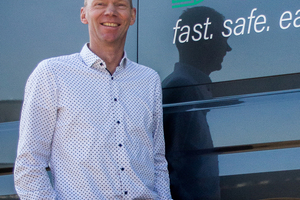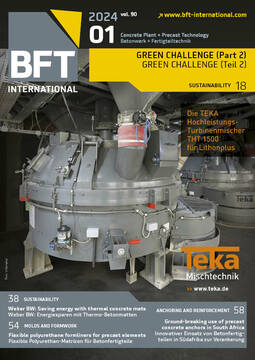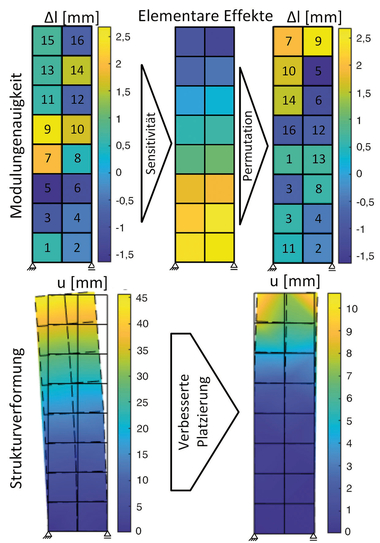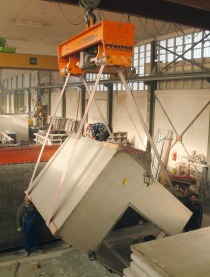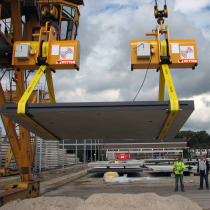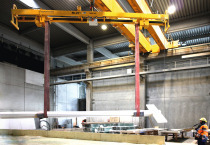Modular turning system positions loads of up to 100 tons
The modular Giromatic turning system from Dumeta can be attached to conventional load lifters and, with the aid of tear-resistant slings or chains, also keeps difficult to balance objects safely under control in every position. Depending on the size and weight of the building component, the system runs over a turning beam and can be coupled to a drive unit with appropriate idling units. Even very bulky building components can be turned within a few minutes. For flexible use on cranes, as well as outdoors, the manufacturer offers, since recently, models with exchangeable batteries for which no power connection is required.
As Dumeta Managing Director Ivo Mulders well knows, “Many companies underestimate the amount of time actually required for handling heavy building components, as well as the risk involved when using unsuitable equipment. Frequently, emergency solutions must be implemented, with great loss of time, or heavy-duty equipment must be borrowed and assembled.” If, for example, only a forklift or an industrial crane is available at a production site, especially bulky and heavy building components cannot be turned at all – or only under greatly unsafe conditions. If they slip off the fork or the provisional turning device on the crane, workers can be injured and damage can be caused in the hall and to the building component. In addition, the weight of many loads is unevenly distributed owing to their dimensions. If the center of gravity is not correctly determined in advance, the building component can tilt out of the lifting device or move uncontrollably.
Turning device brings unbalanced loads into balance
The modular Giromatic system from Dumeta employs an effective turning device, according to the length and weight of the load. For this reason, the company investigates the planned job site in advance. Accordingly, a model for operation with two cranes may, for example, be chosen in which two motor units can also be used instead of one motor and an idler unit, to carry the slings that support the loads. “When handling certain building components, two cranes are needed – owing alone to their weight, which can range up to 100 tons and to enormous lengths, often over 60 meters, since otherwise determination of the lifting point creates difficulties, and an unstable situation results,” explains Mulders.
In this case, the individual tractor units or the spreader beam is attached to the crane hook, and the component is placed in the turning slings. This enables simple turning within a few minutes of heavy loads of rectangular parts, as well as of sharp-edged and eccentrically shaped components. The version with two powered units is of advantage when more grip is needed on every sling, or if the load is no longer in balance. In such cases, the center of gravity of the building component will change irregularly during erection – for example, by adding the axles on a truck chassis. Owing to dual activation, the same traction can be achieved on both sides and gentle and uniform turning carried out.
Battery version for even more flexibility
The Giromatic is compatible with all commercial crane types. “Simple and safe handling is of prime importance for all versions,” explains Mulders. “All turning devices can be operated from a safe distance.” When the building component rests in the slings, which are moved to the load either open or closed, the component is raised and started to turn until the correct alignment is achieved. Power supply, depending on the type of crane, takes place via connection directly on the hook or crane arm. Alternatively, the various Giromatic versions are also available with exchangeable and rechargeable batteries, enabling use of the system anywhere without its own power supply. “We developed the battery version last year, after our customers increasingly requested such a mobile solution,” explains Mulders.” Since every turning process is completed within a few minutes, one battery module with continuous battery runtime of approx. 45 minutes suffices for an entire workday.”
Dumeta, moreover, also advises its customers in the proper choice of material as well as the design of the slings as open or closed versions. Some building components with sharp edges need additional edge protection. For these applications, the company offers special slings with PE coating that are therefore especially durable. In such cases, the mechanical engineering company places great stock on a close exchange of experience with its customers. “When we know where a specific need exists, and which particular problems result in application, we can realize customer-specific customized products and in this way continuously extend our portfolio. After all, there is no lack of problems – but we rise to the challenge and find the solution,” sums up Mulders.
CONTACT
Dumeta B.V.
Marconistraat 26
7575 AR Oldenzaal/Netherlands
+31 (0) 541 533 369

